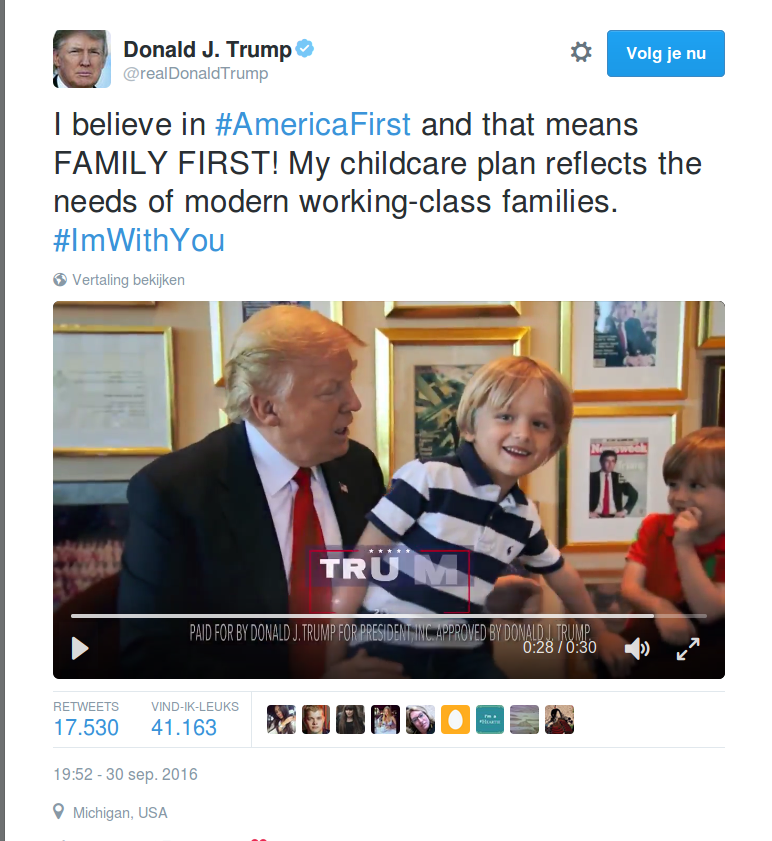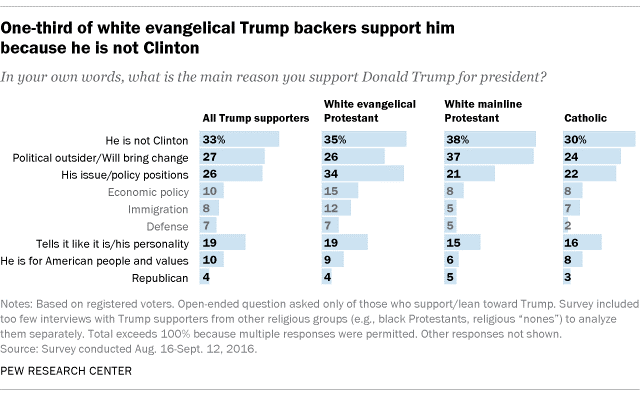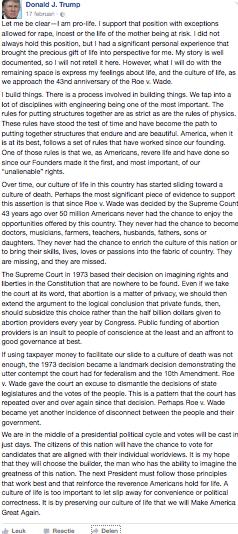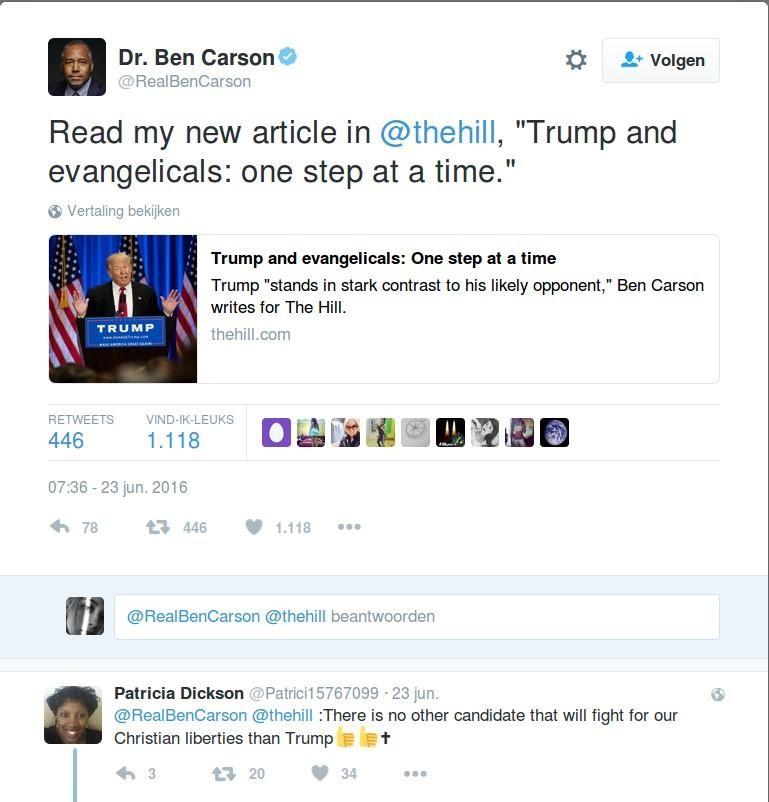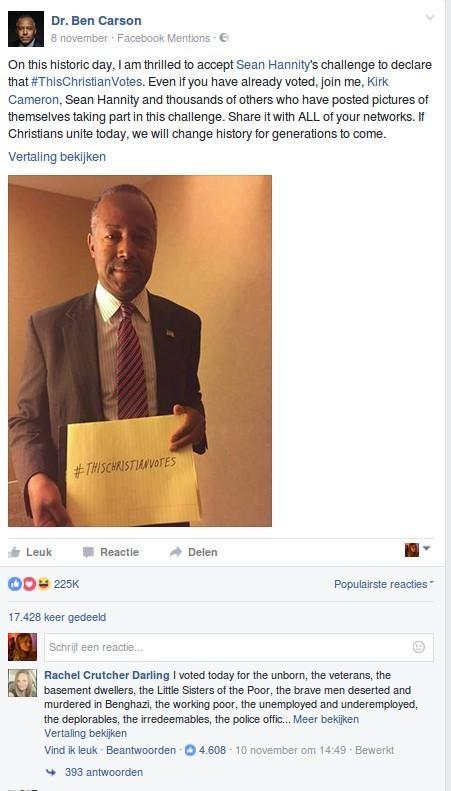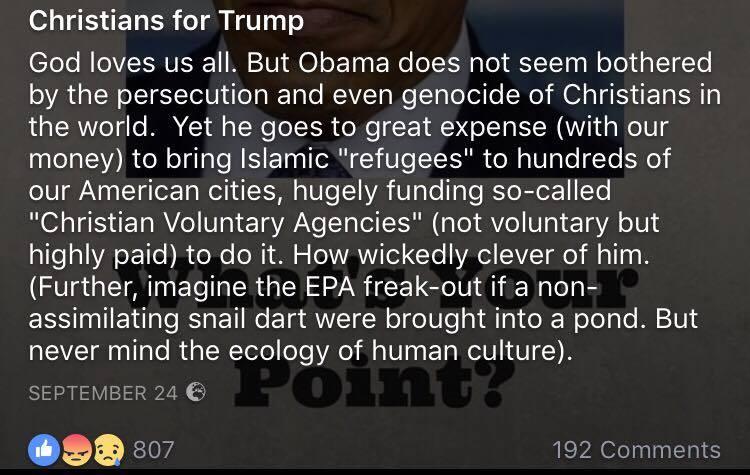
Pro Life, Pro Trump: Trump's appeal to the Christian voters
Despite being called a clown, misogynist and many other insults by mainstream media, Donald Trump still succeeded in winning the 2016 US presidential election. Many of the Christian voters casted their ballot for Trump. In this paper, we will analyze Trump’s message and discourse on the topic of abortion to gain an understanding of why Christians voted for Trump, and to explain how a twice-divorced 'pussy grabbing' businessman metamorphosed into ‘the good father’.
Abortion, family and Trump's Message
To gain an understanding of Trump’s standpoint on the issue of abortion and why it is appealing to the Christian community, we will look at how he creates his message and how this addresses the Christian community. The data used in our analysis comes from social media platforms (Facebook, Instagram and Twitter) and from Trump’s speeches and interviews. An analysis from these formats is important because they are primary sources through which his image and discourse are constructed. Data produced by Trump as the Republican candidate for the presidential election was investigated. It was evident that his message was constructed before and throughout his entire election campaign, and his discourse on abortion was widely spread over this large timeframe.
By message, we do not mean message as it exists in everyday life; “a communication in writing, in speech or by signals” (Merriam-Webster, n.d). In this paper, we refer to message as explained by Lempert & Silverstein (2012: 1): “The politician’s publicly imaginable ‘character’ presented to an elaborate, with a biography and moral profile crafted out of issues rendered of interest in the public sphere”. One of the issues which was constitutive of Trump's message, was abortion. It helped him communicate himself as a Christian, a conservative Republican and as a family man. Building an image as a family man, especially in the light of his banter on women, was not self-evident. Below we will explain how he does this and why this is important.
The screenshot above was taken off Donald Trump’s official website. On his website, it claims he is a proud grandfather of seven. It is also stated that he himself has five children, therefore giving the image that he himself is keen on family building.
When one looks at Donald Trump’s Instagram account, it is clear that he portrays himself as a proud grandfather. From time to time, he posts a picture of himself and his children or grandchildren to show the world that he cares a lot about his family. As he makes his statement that he is pro-life, Trump sends out his messages through these posts about his family. None of his posts about his family are explicitly religion-bound. This does not mean that Trump is not appealing to Christians with this type of communication. Even though his social media posts are not about religion, part of his message is still religious and appeals to values Christians find important e.g., being a family man. Next to such implicit communication, Trump also explicitly identifies himself as a Presbyterian, part of a Christian protestant movement, and has said that he attends church, which seems to also be an important factor for Christian voters, as shown in the figure below.
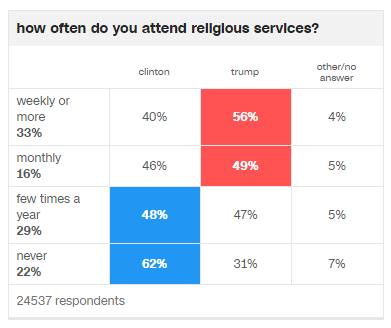
The screenshot below is a tweet from Donald Trump from September 2016, which includes a video about family values and what his plans are to take care of the families in America. Ivanka Trump, his daughter, is the narrator in the video. As a mother, wife and entrepreneur, she explains that Donald Trump understands the needs of a modern workforce and how important family care is. Trump uses his daughter to present the family values that he stands for. Through this video message, Trump creates an image of himself that is interesting for Christians, because of beliefs and values about family which are also deeply rooted in the Christian religion.
Christians against Hillary Clinton
The reason that Christians voted for Donald Trump did not only have to do with Trump himself; it also had to do with his opponent, Hillary Clinton. Many Christians have an enormous dislike for Clinton. According to a Pew Research Center survey, one-third of white evangelicals who voted for Trump did this because they didn’t want Hillary Clinton to be the next president.
In his message targeted towards Christians, Donald Trump made use of their dislike for Hillary Clinton. She fosters a pro-choice stance on abortion. In general, Christians are strictly against abortion. Clearly, on this issue, Christians and Clinton are on opposite sides.
According to Lempert and Silverstein (2012): “Message is both positive - what you want for yourself - and negative - how you want to brand your opponent”. This perfectly fits Trump’s message on abortion. Whereas Clinton stands for abortion, Trump stands for 'pro-life' (Trump, 2016). Saying he is 'pro-life' and therefore against abortion is a form of positive messaging.
On the other hand, Trump denigrates Clinton in their debates by saying she thinks it is okay to stop a pregnancy when the mother is almost due. This is a form of negative messaging as Trump says something about Clinton’s standpoint on this issue, which is negative in the eyes of Christians.
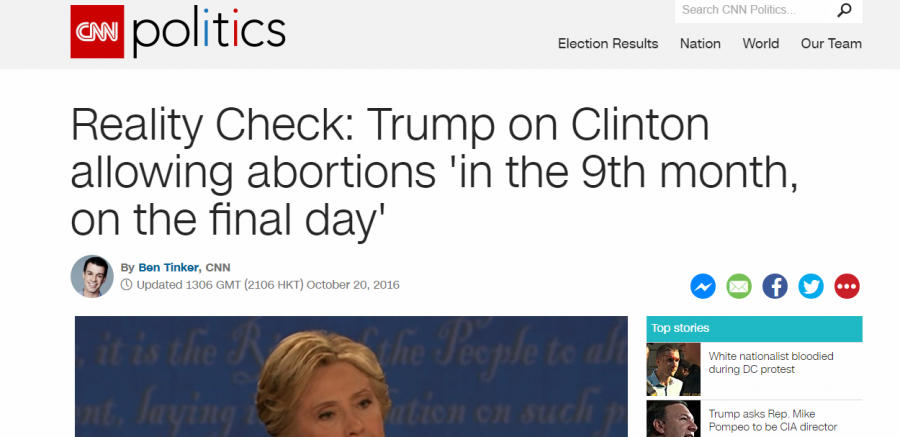
How he promises to stick up for the Christians
While Donald Trump was running for president, he personally reached out to Christian voters multiple times. He assured them that, as president, he would defend Christian values. At a gathering for conservative Christians in Washington, Trump said: “A Trump administration, our Christian heritage will be cherished, protected, defended like you’ve never seen before”. In the same speech, he also said: “How can it be that our media treats people of faith so poorly? One of the reasons is that our politicians have abandoned you to a large extent, and Hillary Clinton? You can forget about her.” Here the earlier mentioned concept of positive and negative messaging from Lempert & Silverstein (2012) is also applicable. Trump saying he will cherish, protect and defend Christian heritage is a form of positive messaging. Whereas in reference to Hillary Clinton doing the same, “you can forget about her,” is a form of negative messaging.
Another way Donald Trump reached out to Christians was by sending a video message to the nation’s churches. In this video, Trump, again, said: “I will defend life, liberty and faith”. He reproduces his message that he will defend Christian values. By doing this, Trump is ‘on-message’, which means he is communicating something in line with the intended message. In the same video, Trump is also on-message regarding his negative messaging about Hillary Clinton. He said: “A vote for Hillary Clinton is a vote for taxpayer funded abortion on demand, a vote for a liberal Supreme Court for the next generation, a vote for new attacks on religious liberty”.
In another video message that was sent to nation’s churches, Mike Pence addresses Christians. This is important, because as Mike Pence is the Vice President of Donald Trump, he will also have an influence in Trump’s presidency. Pence has explicitly said that he is religious, and is even more conservative on some issues than Trump is, which is appeals to Christian voters. In this video, he tells his own story and relationship with Christianity, and how important this is for him. He said: “I’m a Christian, a conservative, and a Republican in that order”. On the abortion issue Pence said: “President Donald Trump will appoint justices to the Supreme Court who will uphold our Constitution and the rights of the unborn”. With this Mike Pence reproduces Trump’s message that he is pro-life and against abortion.
In an interview, Donald Trump himself spoke about the appointment of Supreme Court justices who are pro-life. In this interview, Trump was asked what he would do to protect the sanctity of human life. In response, he said: “I will protect it and the biggest way you can protect is through the Supreme Court and putting people in the court. Actually, the biggest way you can protect it, I guess, is by electing me president”. As it comes to the appointment of justices for Supreme Court Trump later said: “I will appoint judges that will be pro-life”. By saying this Trump again reinforces his message that, as president, he will stick up for Christian values.
Trump's 'pro-life' discourse
During his campaign, Trump took standpoint against abortion, which he talked about on both online and offline platforms. In this section, Trump's discourse on abortion on Facebook, and in several speeches and interviews, will be analyzed.
Framing Donald Trump as a family man, as was previously discussed, makes sense in explaining why his standpoint on abortion is appealing for Christians—especially for evangelical Christians. Lakoff (2016) explains that Evangelical Christianity is “centered around family life”. Trump portraying himself as the father of a big, loving family is in line with the image Lakoff paints of Trump as the ‘strict family father’. The image of the strict family father is useful in explaining Trump’s standpoint on abortion because; “In strict father morality, it is the father who controls sexuality and reproduction. Where the church has political control, there are laws that require parental and spousal notification in the case of proposed abortions” (Lakoff, 2016). Analysing Trump's pro-life standpoint in this way gives us more insight into why the pro-life standpoint is appealing to Christians.
One of the platforms Trump used during his campaign to voice his opinion on abortion was Facebook. Facebook gives Trump a certain ‘voice’. Blommaert (2005) explains the concept of voice as something which people can use to make themselves understood, or not. Social media, and Facebook in particular, is a very useful platform for using one’s voice, because it gives the person time to carefully consider and construct his or her message.
The above post from February 17, 2016, shows how Trump talks about his standpoint on abortion in quite some length. He begins by very shortly stating his opinion on abortion, and then continues by focusing on family life, which strengthens his image as a family man. He personalizes his message by saying that he has had "a significant experience which brought the precious gift of life into perspective for me’".
He then says that he will be telling us his ‘feelings about life’, focusing on abortion as ‘anti-life’, something which destroys life. He strengthens this argument when he says that the culture of life “has started sliding toward a culture of death”. He also strengthens it when he talks about all the opportunities in America, and thus the opportunities that will be missed when a child is aborted; they can never become doctors or teachers. The second paragraph focuses on portraying himself as a builder, and is about the importance of structure and rules in a country. For Christians, rules and structure are important in the abortion debate because these will ensure ‘pro-life’.
Although Trump now claims to be pro-life, supportive of the protection of human embryos and fetuses, he has changed his opinion about abortion throughout the years. In an interview recorded in 1999, Trump explains why he is pro-choice.
Since his presidential campaign however, he claims to be pro-life. Being pro-life plays a big role in getting Christian votes, as they generally tend to be pro-life. This could be one of, or the main, reason(s) he has changed his mind.
However, Trump stays vague about his full opinion on abortion and what the consequences should be for women who have an abortion. In an interview in ‘Sanders One-On-One’ (00.00-01.05 sec), Trump is asked if women having an abortion should be punished. He answers with: ‘"Well, people in certain parts of the Republican Party and the Conservative Republicans would say yes, they should be punished. I would say that it is a very serious problem and it is a problem that we have to decide on".
This exact quote is a very good example of just how carefully constructed Trump’s discourse is. He answers the question, without actually answering the question. He has never mentioned the clear measurements which he would take against abortion. He leaves the responsibility of taking these decisions in the separate states he says. His carefully constructed message is also explained by Lakoff (2016). Lakoff has analysed Trump’s discourse from the perspective of a linguist and a cognitive scientist, and concludes that “he is simply using effective discourse mechanisms to communicate what his [he] wants to communicate to his audience. I have found that he is very careful and very strategic in his use of language”. Lakoff says that, despite many media describing his discourse as a ‘word-salad’, it is the actually the complete opposite of this; "His words and the use of grammar are carefully chosen, and put together artfully, automatically and quickly” (Lakoff, 2016).
On the one hand, the message which Trump gives his supporters is very important, but the way in which he delivers the message is just as important. Clearly, his standpoint against abortion made sense for the supporting Christians. The message against abortion is constructed for the time and space in which it is appealing to some, but it also excludes others (Maly, 2016). Of course, the main goal is to include as many and exclude as little voters as possible. Every word Trump brings into the public is thought about, thoroughly. "Trump’s discourse is framed as ‘the voice of the people’’ according to Maly (2016) and creates enough ambivalence to appeal to different audiences This is also applicable in the abortion case. Trump talks about abortion being horrible and being pro-life himself, but does not speak about punishment or hard measurements. In this way, Trump covers the worries Christians have about abortion and shows he is on their side. However, he does not repel the pro-choice voters with this single argument because he does not talk about severe actions.
Mobilizing Christian power
In today's networked society, social media impact should also be taken into consideration when analysing the mobilisation of religious people to vote for Trump. One of the easiest ways to get as many people as possible involved is just by creating a page or a group on Facebook or using a common hashtag on platforms such as Twitter. In addition, digital media allows the idea of shared awareness to be spread on transnational level (Maly, 2016). Thus, the issues of one community become visible all over the country and recognizable by people with the same problems.
As we have seen, Trump’s image fits with the Christian views for what is good and what is evil. Evangelists are not conservatives, but the idea behind many religions is exactly this father-view of the world. This patriarchal understanding suggests that the man in the family is the one who has total authority for the decision of reproduction (Lakoff, 2016). Furthermore, we observe that certain trust has been built up between the Evangelical church and republican party over the years. Law regulations about the abortion and family question, such as same-sex marriages, led to the cooperation between the church and GOP and obvious clashes of ideas between them and the opposite party (Mohler, 2016).
The identity game
Donald Trump does not explicitly address the Christian community to vote for him. However, the Trump-propaganda machine uses the voice of other important political figures in the Christian community as a tool to mobilize the Christians to go and vote for him, which will be illustrated below.
A key figure is Ben Carson, who was also a republican candidate and who is consistent in his Christian and republican identity and message through his social media platforms (Gommers, 2016). Carson dropped out of the campaign and planned to use his power to mobilize the Christians to vote for Trump.
As you can see in this Twitter post, Carson promotes as the fellow republican, Trump, on his twitter account. As Carson is a Christian, the Tweet addresses Christian voters who can relate to him and who also think of Trump as their future president. With this tweet, Trump is made visible and is constructed as the perfect candidate for the Christian community by Carson.
On election day, Carson posted a Facebook post with the hashtag #Thischristianvotes. With the use of the hashtag, he is aimed to go viral, which is also what he did before with his #IamChristian hash tag (Gommers, 2016). He is not explicitly stating to vote for Trump, but as a republican and posting this on election day, he implicitly calls the Christians to mobilize and go vote for Trump. Carson has reached quite a lot of people; for example his Facebook post with 225 thousand likes, 17,428 shared and 5,2 thousand reactions.
#ChristiansForTrump
#ChristiansForTrump is also used as a mobilizing name. A 'mobilizing name' is a name by which people group themselves (Maly, 2016). #ChristiansforTrump is used by and for the group of Christians who have already decided that they are going to support Trump. By using these, and other, hashtags they address toward a group who may be undecided who they are going to vote for.
By presenting themselves as Christians, they create a collective identity and call other Christians to vote for Trump and join them. Not only being Christian is crucial for their identity, but also that they support Trump. According to Castells (2010), organising yourself in primary identity such as religion is a force for individual security.
The Christian community online using #ChristiansforTrump, will ultimately follow only like-minded Twitter accounts and search using only particular hashtags, such as #prolife or #family. According to Blommaert (2005), The essential concept of media is that it mediates between us and the world as we perceive it. This is a dangerous cycle: part of the Christian community and some key figures started promoting Donald Trump as the president for the Christian heritage and, like-minded people will only see these things on Twitter. This creates a ‘filter bubble’, meaning that people will ultimately only see the things relevant to their interests.
Facebook and the discourse of the Christian community
Facebook and other social media platforms provide their users with freedom to share their opinions and criticize people in power. Perhaps the most influential group of Christian Trump supporters is Christians for Trump on Facebook, with over 365.000 users who like the page. In order to understand the method of mobilizing Christians online in case of this election, we will use the mechanisms which Lakoff (2016) suggests that Trump uses for his propaganda. The linguist suggests that certain discourse instruments are used to convince people in his point. These mechanisms are repetition, framing, using a well-known examples and grammar use. These seem to be adopted by online Christian groups who support Trump’s ideas. The term repetition is self-explanatory: during his campaign, Trump constantly repeated himself and certain phrases about his pro-life views and rarely added new opinions or views. Christians for Trump also use the same conceptions again and again, which can be seen in the memes they used.
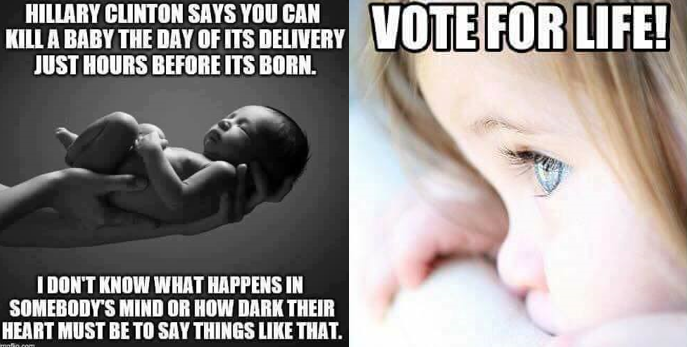
They also managed to create a frame for Hillary Clinton such as #CrookedHillary, a hashtag that often appears on Trump’s social media. Clinton is presented as woman with no apprehension of killing a baby and risking the life of the mother, claiming that this is legal. That leads to a third and fourth kind of mechanisms, the use of well-known examples and grammar usage. Lakoff (2016) points to Trump’s ideas for attacks from Muslims which generate fear among the voters.
A similar post can be found on the page of 'Christians for Trump', who used the same technique. It starts with one of the most common Christian phrases: 'God loves us all'. However, after this statement, a contrast quickly emerges in which phrases such as 'genocide of the Christians' and 'with our money' almost immediately catch attention. Future genocide and the idea that American citizens would help this with their money, gives rise to anger within a common situation. What Christians might expect as a safe option is to find a father, Trump, who would fit their patriarchal views, who would fight for future generations of the USA and the sanctity of human life.
Conclusion
Identity was key in the 2016 American Presidential election. An election won by Donald Trump, a twice-divorced businessman who, in the eyes of his supporters, managed to metamorphose into ‘the good father’. In this paper we analysed Trump’s message and discourse on the topic of abortion in order to gain an understanding into why Christians voted for Trump. This analysis showed that by making himself visible through various ways, Trump was able to construct his message of him being the president for Christian heritage. He not only managed to gain support of Christian voters, but he also managed to make them mobilize supporters for him.
References
Blommaert, J. (2005). Discourse: Key topics in sociolinguistics. Cambridge: University Press.
Castells, M. (2010). The rise of networked society: Second edition with a new preface. Chichester: John Wiley & Sons Ltd.
Gommers, S. (2016, August 29). Ben Carson’s #IamaChristian: The political effect of going viral. Diggit Magazine.
Lakoff, G. (2016). Understanding Trump. George Lakoff Blog. Last retrieved on 10-12-2016.
Lakoff, G. (2016). Understanding Trump’s Use of Language. George Lakoff Blog. Last retrieved on 10-12-2016.
Lempert, M., & Silverstein, M. (2012). Creatures of politics: Media, Message, and the American Presidency. Bloomington: Indiana University Press
Maly, I. (2016). New Media and politics Class 10 - 2016 -Hard boven hard - Occupy [PowerPoint Slides].
Maly, I. (2016). Trump, the celebrity-businessman and vox populism. Diggit Magazine.
Merriam-Webster (n.d.). Definition: ‘message’. Last retrieved: 11-12-2016.
Mohler, R. Alber Jr. (2016, October 9). Donald Trump has created an excruciating moment for evangelicals.
Trump, D. (2016). Official website. Last retrieved on 10-12-2016.



